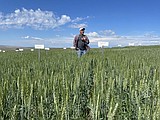News
Read recent and past articles from Basin Business Journal here
Good harvests for for potatoes, apples, wheat and raspberries in 2025
MOSES LAKE – With Fall in full swing, growers around the area are either completing their harvests or are on the v…
Rain, cost of products bring hay prices up
COLUMBIA BASIN — As costs continue to rise in the current economy, the hit can be felt throughout the market, from consumers to producers — including in the ha…
Washington company develops special shoes for people with diabetes
REDMOND — A Washington-based maker of remote sensors for health care has teamed up with a Florida-based maker of protective footwear for people with diabetes to create shoes that can monitor diabetic ulcers and hel…
Electric revolution: Basin companies at the forefront of energy change
MOSES LAKE — REC Silicon will resume production of solar-grade polysilicon at its facility in Moses Lake, according to CEO James May. May spoke during a confer…
USDA to offer shipping container assistance for agricultural export
WASHINGTON, D.C. — The U.S. Department of Agriculture announced in late May that the Farm Service Agency is accepting applications from interested agricultural producers and
'Wheat is king': Weather, disease, oil discussed at Dryland Institute field day
LIND — In 107 years, Washington State University’s Dryland Research Station in Lind has only had to cancel its field day three times.
USDA: Wheat crop expected to increase this year
PORTLAND — The U.S. Department of Agriculture is forecasting a major increase in wheat production in Washington in 2022, according to a report published by the department’s National Agricultural Statistics Service.
Washington grape harvest still strong
CENTRAL WASHINGTON — Despite a cold spring, wine grapes are looking good, according to a couple of local growers.
Biological fungicide OK’d for US use
WAGENINGEN, Netherlands — Dutch agricultural chemical maker Ceradis Crop Protection announced in late April that its CeraFruta postharvest biological fungicide has now been listed for organic use in the United Stat…
Banner Bank hires new mortgage officer
EPHRATA — Banner Bank has hired veteran lender Lorena Urrutia as its new mortgage loan officer for its Ephrata office.
SBA recognizes Washington businesses
SEATTLE — Four Washington small business owners have been recognized by the Small Business Administration as part of the agency’s 2022 National Small Business Week program.






